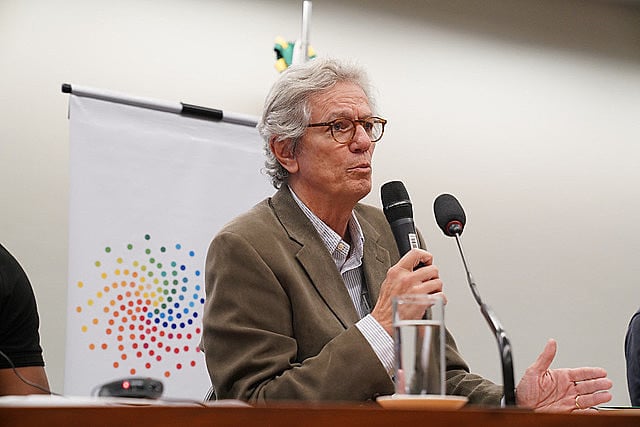The increasingly close relations between the Jair Bolsonaro administration and Donald Trump’s White House are an obstacle to Brazil if it wants to become once again a major international player. That is the opinion of Paulo Nogueira Batista Junior, a former vice president of the New Development Bank — known as the BRICS Development Bank.
The economist was one of the panelists of the first activity of the Peoples’ BRICS Summit, a two-day event organized by people’s movements from Brazil, Russia, India, China, and South Africa that is taking place in Brasília on Nov. 11 and 12.
::“Peoples’ BRICS” to be held concurrently with BRICS Summit in November::
Batista Junior argued that the Brazilian government didn’t make good use of its turn in the presidency of the BRICS, in 2019. “It has been underestimated by the government. So this gathering of social movements here in Brasília is a way to make up for the low profile Brazil has been taking in the Temer and Bolsonaro administrations,” he said during the first panel of the day, Imperialism, International Geopolitics, Role of BRICS and the People.
According to the expert, the BRICS bloc was born as an counter-hegemonic project, but it has never adopted a language of conflict with the West. During its first few years, its goal was basically to gain space in the International Monetary Fund (IMF).
As major international powers reacted to it, as of 2012, the five countries that are members of the bloc started to invest to create their own monetary funds and institutions — a process that reached its pinnacle in 2014, during the BRICS Summit hosted by the then president of Brazil, Dilma Rousseff.
But the international encirclement of Russia, the coup staged in Brazil, the economic and political crisis in South Africa, and the deteriorating relations between China and India have harmed that process, which, the economist says, must be resumed.
“While Brazil used to be a driving force of the BRICS, it became a relatively passive participant, with few initiatives and few ideas,” Batista Junior said. “This is actually happening with this current government, which is excessively, sometimes embarrassingly aligned with the United States, and that damages Brazil’s credibility.”
Latin America
When asked about the political effervescence in Latin America in recent months, the economist said he believes we are living a moment of “instability that points to change,” as seen with the election of Alberto Fernández in Argentina, the protests in Chile and Ecuador, and the release of ex-president Luiz Inácio Lula da Silva in Brazil.
“Unfortunately, we’ve seen a setback in Bolivia, with a violent coup staged against president Evo Morales. But that is the struggle, it’s made of victories and setbacks. I would say that, despite that, the overall trend in Latin America is positive, considering the recent past. It’s positive in the sense of regaining autonomy, recovering governments that are leaning toward social inclusion and income distribution,” he said.
Counterpoint
The Peoples’ BRICS Summit is taking place in the lower chamber of Congress in Brasília, the capital of Brazil. Brasil de Fato is on the ground covering the event and producing special pieces in Portuguese, English, and Spanish.
In the two-day event on Monday and Tuesday, researchers and political activists from the five countries that are members of the BRICS will discuss topics such as imperialism, political and economic crisis, international solidarity, and the rise of authoritarianism.
The goal of the organizers is to draw attention to the common challenges facing the people from Brazil, Russia, India, China, and South Africa, in order to elaborate proposals for integration beyond the discussions held by the countries' authorities, who will meet for the BRICS Summit on Nov. 13 and 14, also in Brasília.




